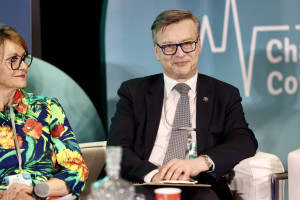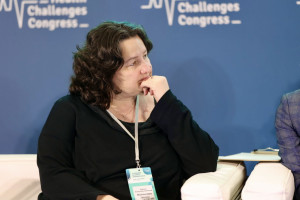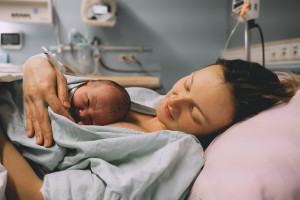This topic cannot be subject to political games. Doctors on women's health


 Authors: Monika Chruścińska-Dragan ; Klara Klinger • Source: Rynek Zdrowia • Added: May 30, 2025 07:44
Authors: Monika Chruścińska-Dragan ; Klara Klinger • Source: Rynek Zdrowia • Added: May 30, 2025 07:44
- We are not only doctors, gynecologists with many years of practice, but above all women, aware of how everyday political decisions affect our health, safety and future - say gynecology and obstetrics specialists, prof. Ewa Wender-Ożegowska and prof. Violetta Skrzypulec-Plinta in an interview with Rynek Zdrowia.
- We talk with Prof. Ewa Wender-Ożegowska, national consultant in obstetrics and gynecology, and Prof. Violetta Skrzypulec-Plinta, head of the Department of Women's Health at the Medical University of Silesia in Katowice, about how politics "interferes" with women's health and the positive changes for patients that have nevertheless been introduced in recent months.
- - We are not only doctors, gynecologists with many years of practice, but above all women, aware of how everyday political decisions affect our health, safety and future - the experts emphasize
- - Contraception should not be a political topic at all. Contraceptives are a tool that saves a woman's health and life in many situations - emphasizes Prof. Skrzypulec-Plinta
- We will also discuss the place of women in the state's health policy on June 9 and 10 during the first Women's Health Forum at the International Congress Centre in Katowice.
Health Market: Health should be apolitical, only purely medical. Is it so in practice?
Prof. Ewa Wender-Ożegowska, national consultant in obstetrics and gynecology: We would like to emphasize that we are not only doctors, gynecologists with many years of practice, but above all women, aware of how everyday political decisions affect our health, safety and the future of our families. As doctors who have been accompanying women for years in the most important moments of their lives, from the first period, through family planning, pregnancy to menopause, we know one thing: our health cannot be the subject of political games.
Prof. Violetta Skrzypulec-Plinta, Head of the Department of Women's Health and the Department of Reproductive Health and Sexology at the Medical University of Silesia: I am a gynecologist with 43 years of practice, women's health has always been a priority for me and I believe that politics should not interfere with it.
Politics always "interferes" with health because that's how the whole system works. Does gender matter in this context?
Prof. Ewa Wender-Ożegowska: Politics affects the health of both Polish women and men, but women's health is often more sensitive to political decisions, mainly due to the specific health needs related to female biology (pregnancy, childbirth, menopause), reproductive health issues, challenges related to family care (women more often take care of children and the elderly) and due to varying access to benefits depending on place of residence, social status or professional situation.
In smaller towns, limited access to gynecological and obstetric care, and therefore to specialists, affects the later diagnosis of a number of diseases, including cervical cancer and breast cancer. In many regions, limited access to contraception, and especially emergency contraception (requires a prescription), limits women's reproductive autonomy.
The previous government pursued a very restrictive policy on reproductive health and abortion. In Poland, the current laws are among the most restrictive in Europe, and the Constitutional Tribunal's ruling in 2020 made it virtually impossible to obtain legal abortion even in cases of severe fetal defects. The result is an increase in the number of abortions outside the official system and the associated health and mental health risks.

Decision makers always emphasize that the patient and health safety are what counts. It is the doctor who decides about that.
Prof. Ewa Wender-Ożegowska: Unfortunately, declarations often do not translate into practice. We still have imperfect education, government programs are blocked, aimed at health education of children and youth from the youngest years in schools.
Despite the existence of preventive programs (e.g. mammography, cytology), their availability, quality and effectiveness of promotion are insufficient – especially in rural areas and among women of lower socio-economic status. Low attendance in preventive programs is not only due to the "lack of awareness" of women, but also to the lack of facilities (e.g. flexible hours, mobile testing points, appropriate communication).
What are your experiences from the "office" in the context of women's health and how has it changed over the years?
Prof. Wender-Ożegowska: Many times in recent years, patients have asked what would happen if we diagnosed their child with a developmental defect, whether there would be any possible way to help them. These were very difficult conversations, because remember that a doctor could be punished for indicating possible solutions. In situations where we diagnosed a developmental defect, as we all know, patients had to seek help from a psychiatrist, because only in a situation where the woman's life or health is at risk, and not because of the child's condition, can we decide to terminate the pregnancy. More and more patients come to me with tears in their eyes, because they are afraid that they will once again be forced to heroism, instead of having the right to choose. This should not be a political issue.
Prof. Skrzypulec-Plinta: In my practice I have dealt with a wide variety of cases, including raped thirteen-year-olds, molested children, and pregnant women whose doctors just threw up their hands after diagnosing fetal developmental defects in the 18th week because they had signed a conscience clause.
I think that all these issues concerning women's reproductive health need to be sorted out, boundaries need to be set, and patients need to be given the opportunity to choose. There are women who, knowing that their child has lethal defects, decide to give birth because they want to say goodbye and bury it, but there are also those for whom it turns out to be too much of a psychological burden and they commit suicide.

That's why giving women the opportunity to choose is most important. My job as a doctor is to present all the options to the patient. To give her a chance to think about what she wants her life to look like. Contraception is also for that purpose.
What are we missing in women's health?
Prof. Wender-Ożegowska: Poland is at the bottom of Europe in terms of contraceptive availability. This is due to a number of factors. There is no reimbursement for modern contraceptives. Many effective methods, such as intrauterine devices, implants, and new-generation pills, are fully paid for. For many women, especially young and poor women, the costs are prohibitive.
Emergency contraception (the so-called "morning-after pill") is available on prescription. Poland is one of the few EU countries that requires a prescription for ellaOne (available over the counter in most EU countries). This is a significant barrier, especially since the drug's duration of action is limited to 72 hours.
There is also a lack of reliable sexual education in schools, which is why young people do not have access to objective, scientific knowledge about methods of preventing pregnancy and reproductive health. Many girls and young women do not have easy access to a gynecologist, especially in smaller towns, and there is also a fear of judgment or a lack of discretion.
The ideologization of health policy, pursued for many years, has resulted in decisions regarding the availability of contraception being dictated by worldview, not medical recommendations or the interests of public health. Unfortunately, stereotypes are often so ingrained in some environments that it is not easy to break them.
Prof. Skrzypulec-Plinta: Contraception should not be a political topic at all. It should be up to a woman to decide whether and when she wants to get pregnant, how long after the previous delivery, etc. The discussion about the availability of the morning-after pill on prescription is simply abstract. It should be widely available. These are expensive preparations, they are not embryotoxic or teratogenic, so they do not harm the health and life of the patient.
I would also like to point out that contraceptives are in many situations a tool that saves a woman's health and life, because we reach for them in the prevention of ovarian cancer, prevention of uterine cancer, treatment of cysts, heavy bleeding or menstrual disorders. In other words, we use the non-contraceptive benefits of contraception in medical practice.
It is the doctor's job to decide when and what medications should be used, to tell patients about the disadvantages of individual contraceptive methods and to give them the opportunity to choose. If the patient is seriously ill, we are there to help her make a decision.
I believe that contraception should be available in Poland for free until the age of 25, and emergency contraception should be available without a prescription. Young patients' fears of being assessed and the lack of decisiveness on the part of doctors lead to them buying contraceptives on the Internet, not suited to their needs and health condition, without taking into account the risks.
In vitro, reimbursement of further tests, access to therapy. "Education remains a challenge"However, a few changes in the area of reproductive health have been implemented. Is there anything we can be proud of?
Prof. Skrzypulec-Plinta: I see increasingly broader opportunities that we create, which unfortunately we do not fully utilize. I mean access to vaccinations, preventive cytological and mammographic tests. In gynecology, we have excellently developed minimally invasive surgery, oncological treatment. However, in order to use all this, patients have to go to a gynecologist. This requires health education from the youngest age.
We cannot talk about health education as a political program, because it is supposed to be a school program that makes young people aware of the consequences of risky sexual behavior, sexually transmitted diseases, etc.
Prof. Wender-Ożegowska: There are solutions that are the result of changes introduced by the community for years. And the effects are visible - we have increasingly better perinatal care for high-risk pregnancies. In large clinical centers in Poland, there is advanced care for pregnant women with pregnancy pathology. Neonatology is at a high level, we have one of the best survival rates for extremely premature babies.
In many places there are specialist Breast Units that provide comprehensive care: diagnostics, surgical, oncological and reconstructive treatment. Poland has increasingly better access to modern therapies, although access is unfortunately uneven geographically.
We are working on a new standard of perinatal care, together with non-governmental organizations that play a huge role in educating and supporting women and monitoring the quality of services.
We must ensure equal access to all medical services, regardless of place of residence and social status. Women in villages and small towns often have, unfortunately, still limited access to specialists (e.g. endocrinologists, oncologists, gynaecologists), diagnostics (e.g. resonance imaging, genetic testing), and services within the National Health Fund. This requires better organization of the network of facilities, telemedicine, and medical transport. But also the introduction of a free government in-vitro program in Poland, popularization of prenatal tests, extension of the period of free mammographic tests, introduction of free vaccinations for pregnant women - these are good things.
There have been government announcements about the planned restoration of availability of emergency contraception without a prescription. This would be a big step forward. Discussions are also underway about including some forms of contraception in the reimbursement system. A very important element of women's health policy is care for women's mental health.
Currently, a Team appointed by the Minister of Health is working to develop procedures and guidelines for dealing with people who have experienced sexual violence. There is still a lack of systemic solutions in this area, rapid medical and psychological intervention after sexual violence, access to safe contraception and treatment after rape, or legal and social support for women experiencing domestic violence.
Politics in Poland has a significant impact on women's health, and declarations often did not translate, and unfortunately still do not always translate into practice. Women's health is an area where social inequalities and political decisions are particularly visible - both in terms of physical and mental health. We need leaders who understand our needs and support our rights.
Copyrighted material - reprint rules are specified in the regulations .
rynekzdrowia











